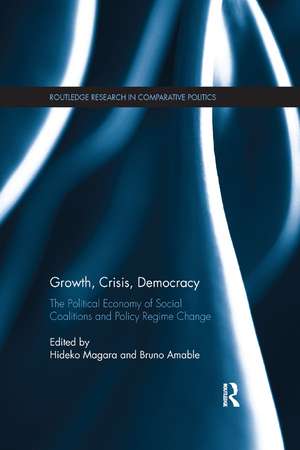Growth, Crisis, Democracy: The Political Economy of Social Coalitions and Policy Regime Change: Routledge Research in Comparative Politics
Editat de Hideko Magara, Bruno Amableen Limba Engleză Paperback – 23 ian 2019
This book is premised on tentative conclusions that Magara and her research collaborators have reached as a result of three years of study related to our previous project on economic crises and policy regimes. Recognising the need to analyse fluid and unstable situations, we have set up a new research design in which we emphasise political variables—whether political leaders and citizens can overcome the various weaknesses inherent in democracy and escape from an economic crisis by establishing an effective social coalition. A new policy regime can be stable only if it is supported by a sufficiently large coalition of social groups whose most important policy demands are satisfied within the new policy regime.
| Toate formatele și edițiile | Preț | Express |
|---|---|---|
| Paperback (1) | 416.22 lei 6-8 săpt. | |
| Taylor & Francis – 23 ian 2019 | 416.22 lei 6-8 săpt. | |
| Hardback (1) | 1002.68 lei 6-8 săpt. | |
| Taylor & Francis – 30 mai 2017 | 1002.68 lei 6-8 săpt. |
Din seria Routledge Research in Comparative Politics
- 9%
 Preț: 1039.13 lei
Preț: 1039.13 lei -
 Preț: 385.40 lei
Preț: 385.40 lei - 9%
 Preț: 1005.50 lei
Preț: 1005.50 lei -
 Preț: 191.93 lei
Preț: 191.93 lei - 18%
 Preț: 1002.80 lei
Preț: 1002.80 lei -
 Preț: 495.94 lei
Preț: 495.94 lei - 18%
 Preț: 1056.47 lei
Preț: 1056.47 lei - 30%
 Preț: 333.04 lei
Preț: 333.04 lei - 18%
 Preț: 1054.27 lei
Preț: 1054.27 lei - 18%
 Preț: 1075.49 lei
Preț: 1075.49 lei - 18%
 Preț: 1058.79 lei
Preț: 1058.79 lei - 18%
 Preț: 1062.98 lei
Preț: 1062.98 lei -
 Preț: 413.76 lei
Preț: 413.76 lei - 18%
 Preț: 1062.98 lei
Preț: 1062.98 lei - 18%
 Preț: 1059.00 lei
Preț: 1059.00 lei -
 Preț: 425.86 lei
Preț: 425.86 lei - 18%
 Preț: 1106.36 lei
Preț: 1106.36 lei - 18%
 Preț: 1058.65 lei
Preț: 1058.65 lei - 18%
 Preț: 1061.06 lei
Preț: 1061.06 lei - 18%
 Preț: 1058.79 lei
Preț: 1058.79 lei - 15%
 Preț: 671.28 lei
Preț: 671.28 lei - 18%
 Preț: 1062.98 lei
Preț: 1062.98 lei -
 Preț: 334.41 lei
Preț: 334.41 lei - 18%
 Preț: 1055.21 lei
Preț: 1055.21 lei - 18%
 Preț: 1056.80 lei
Preț: 1056.80 lei - 18%
 Preț: 956.83 lei
Preț: 956.83 lei - 18%
 Preț: 1064.01 lei
Preț: 1064.01 lei - 18%
 Preț: 1057.05 lei
Preț: 1057.05 lei - 18%
 Preț: 1068.18 lei
Preț: 1068.18 lei - 18%
 Preț: 1217.29 lei
Preț: 1217.29 lei - 15%
 Preț: 701.96 lei
Preț: 701.96 lei - 18%
 Preț: 703.93 lei
Preț: 703.93 lei - 18%
 Preț: 703.09 lei
Preț: 703.09 lei - 18%
 Preț: 1065.30 lei
Preț: 1065.30 lei - 18%
 Preț: 1059.48 lei
Preț: 1059.48 lei - 28%
 Preț: 819.25 lei
Preț: 819.25 lei - 18%
 Preț: 1055.51 lei
Preț: 1055.51 lei - 18%
 Preț: 1052.35 lei
Preț: 1052.35 lei - 28%
 Preț: 849.37 lei
Preț: 849.37 lei - 18%
 Preț: 999.82 lei
Preț: 999.82 lei - 18%
 Preț: 1059.84 lei
Preț: 1059.84 lei -
 Preț: 392.48 lei
Preț: 392.48 lei - 18%
 Preț: 1064.52 lei
Preț: 1064.52 lei -
 Preț: 502.30 lei
Preț: 502.30 lei - 18%
 Preț: 1006.60 lei
Preț: 1006.60 lei - 18%
 Preț: 1066.09 lei
Preț: 1066.09 lei
Preț: 416.22 lei
Nou
Puncte Express: 624
Preț estimativ în valută:
79.65€ • 82.85$ • 65.76£
79.65€ • 82.85$ • 65.76£
Carte tipărită la comandă
Livrare economică 14-28 aprilie
Preluare comenzi: 021 569.72.76
Specificații
ISBN-13: 9780367141905
ISBN-10: 0367141906
Pagini: 254
Ilustrații: 52
Dimensiuni: 156 x 234 x 15 mm
Greutate: 0.45 kg
Ediția:1
Editura: Taylor & Francis
Colecția Routledge
Seria Routledge Research in Comparative Politics
Locul publicării:Oxford, United Kingdom
ISBN-10: 0367141906
Pagini: 254
Ilustrații: 52
Dimensiuni: 156 x 234 x 15 mm
Greutate: 0.45 kg
Ediția:1
Editura: Taylor & Francis
Colecția Routledge
Seria Routledge Research in Comparative Politics
Locul publicării:Oxford, United Kingdom
Cuprins
- Introduction: Social Coalitions between Equilibria and Crises (Hideko Magara)
- The emergence of an anti-bourgeois bloc in France (Bruno Amable & Stefano Palombarini)
- Abenomics and Japanese Politics (Masanobu Ido)
- Who turned their back on the SPD? Electoral disaffection with the German Social Democratic Party and the Hartz reforms (Baptiste Françon)
- The Transformation of the Swedish Model since the 1990s: The Political Aspects of Institutional Change (Nanako Fujita )
- The EU neoliberal policy regime and main political alternatives (Alberto Martinelli)
- Political Reformation of Social Coalitions for Elections (Yuki Yanai)
- Developmental class coalitions: historical experiences and prospects (Luiz Carlos Bresser-Pereira and Marcus Ianoni
- Authoritarian Developmentalism, Democratic Neo-liberalism, and Economic Growth in Korea: Economic Growth in Different Policy Regimes (Hyug Baeg Im)
- Class coalitions in new and consolidated democracies: the case of Brazil (Luiz Carlos Bresser-Pereira and Marcus Ianon
Notă biografică
Hideko Magara is Professor of Political Science at Waseda University, Tokyo, Japan.
Bruno Amable is Professor of Economics at Université Paris 1 Panthéon-Sorbonne
Bruno Amable is Professor of Economics at Université Paris 1 Panthéon-Sorbonne
Descriere
This book is premised on tentative conclusions that Magara and her research collaborators have reached as a result of three years of study related to our previous project on economic crises and policy regimes. Recognising the need to analyse fluid and unstable situations, we have set up a new research design in which we emphasise political variables—whether political leaders and citizens can overcome the various weaknesses inherent in democracy and escape from an economic crisis by establishing an effective social coalition.
